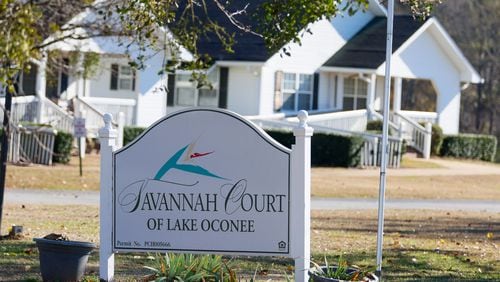Eight months after Georgia regulators initiated efforts to shutter a troubled Greensboro-assisted living facility, a state administrative judge issued a decision on Friday that will allow the home to stay open.
The decision, written by Administrative Law Judge Charles Beaudrot, finds that Georgia’s Department of Community Health (DCH) can fine Savannah Court of Lake Oconee for some safety violations and other infractions, but regulators lack grounds to revoke the facility’s permit.
“The Department has not, however, shown by a preponderance of the evidence that its proposed revocation of Savannah Court’s permit to operate is justified,” Beaudrot wrote in his 47-page decision.
The state issued a closure notice in August after inspectors with DCH found seven violations during inspections on July 31 and Aug. 1. The violations, the state argued, underscored a lack of commitment to the safety and well-being of residents, as well as a failure to adhere to a settlement agreement the facility had entered into with DCH in March 2023 after the state had cited the home for other violations.
During a hearing in early January, Savannah Court’s attorneys argued that DCH failed to prove that the home’s alleged rule violations were severe enough for it to be shut down. The attorneys for the home also tried to raise doubts about some of the state inspector’s assessments and argued that the state had unfairly marked some rule violations as more severe than they should have been categorized.
Beaudrot expressed concerns over some of the incidents at Savannah Court, including a sexual assault of one resident by another that occurred in October after the revocation notice was issued. He ultimately decided “the Department has not met its burden and shown that the requisite severity of those violations justifies revocation of Savannah Court’s permit to operate.”
The judge, in his concluding observations, noted that a closure would leave many in the community without services, quoting DCH counsel Jason Reeves, who said during the hearing that “[Savannah Court] provides an invaluable service to the community,” and revocation “would create a void in th[e] community.”
The judge did not include the second half of Reeves’s comment which was that this was not a reason to keep a facility open that has been flagged so many times for repeated violations.
“We believe that the community’s only option can’t be a poor option or a bad option,” he had said at the initial Jan 3 hearing.
Savannah Court was the subject of a January investigation by The Atlanta Journal-Constitution that found more than 70 state violations since 2021, including the death of two residents and the sexual assault last fall. The report highlighted problems with the state’s oversight of assisted living and personal care facilities and its lackluster enforcement of state regulations.
The multi-month legal batter over Savannah Court’s future underscored issues with oversight.
While the state ultimately pushed with vigor to have the facility’s license revoked, they were initially less forceful, agreeing to push back a November closure hearing because a third settlement agreement was under consideration. The two parties were still discussing such a possibility on Jan. 3 — the day of the rescheduled hearing — but ultimately reversed course that afternoon.
It was the same day the AJC’s investigation was published.
The state did not respond Friday to a request for comment on the decision. Neither did Savannah Court or its Florida-based parent company Senior Living Management.
“I am not surprised at the decision not to close the facility because of the high burden of proof required,” said Kate Hughes, an attorney with Wagner Hughes LLC, who filed a wrongful death claim against the facility in January on behalf of the son of a former resident.
“It is a shame that the threat of closure is what it took to create potential change, but, hopefully, it caused the facility to fix its broken system and provide safe care to its residents,” she continued.






